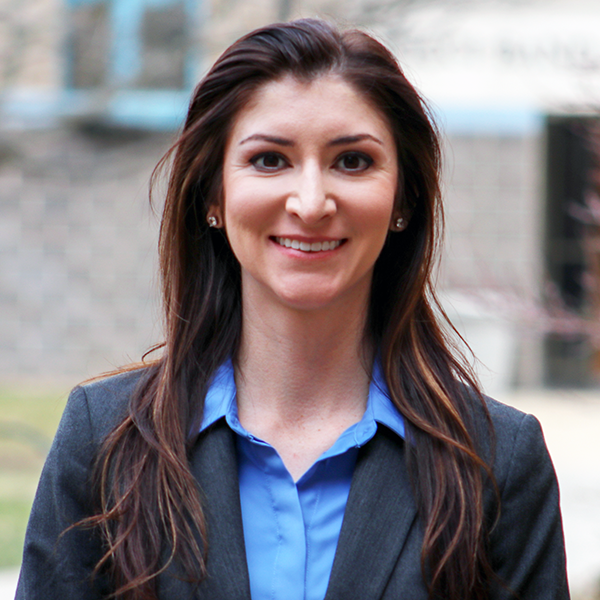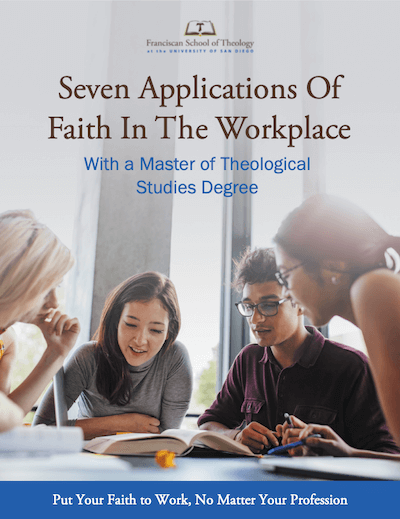A Master of Theological Studies degree provides a strong foundation for careers in education leadership, and various forms of ministry, as well as further graduate studies in theology. . Additionally, many students earn an MTS degree and apply it to careers unrelated to religion.
Whatever your chosen career path, there are some important factors to consider when determining if an MTS degree will help you fulfill your professional — and personal — goals.
What is Theological Studies?
Theology is the academic study of religion, addressing the philosophical, ethical, and metaphysical questions ever-present in faith. Students of theology seek to understand how the divine relates to our world today, throughout history, and into the future. Theologians examine religious thought and traditions as expressed through:
- Language
- Worship
- Literature
- Art
In graduate-level theological studies programs, there is usually a strong emphasis on intellectual discussions, debates, and academic presentations of students’ findings and conclusions. Theology master’s degree programs are often aligned with a specific faith, denomination, or charism.
Should You Earn a Master of Theological Studies?
19 Considerations
Where to begin? With your most pressing questions, both large and small.
“Ask questions,” advises Dr. Darleen Pryds, PhD, Associate Professor of Christian Spirituality and History at the Franciscan School of Theology (FST), which offers an online Master of Theological Studies – Franciscan Theology degree. “There are no stupid questions; and if you have a question, someone else [probably] does too, so always ask the questions.”
Before you settle on a master’s degree program, here are some key questions to ask yourself during your search:
1. What are your personal criteria for a master’s program?
Practical considerations can include location, course format, cost, and program length. You may also choose to prioritize programs with high alumni placement rates or frequently published faculty members. Consider which, if any, specializations you’d like your ideal program to have — are you interested in liturgy, for example, or inclusion excellence in worship? For theological programs in particular, think about how much (or whether) the particular faith framework matters to you.
2. What have graduates of the program gone on to do?
Alumni are some of your most valuable resources when you’re exploring theology degree programs. If a large portion of alumni from a certain theological school have entered teaching professions, you know the program likely has a strong educational component. Admissions counselors can provide you with contact information of alumni who would be willing to share their academic and post-grad experiences.
3. Does the program have a capstone or thesis component?
This unit serves as the culmination of a course of study, and gives students the opportunity to put everything they’ve learned into practice. Thesis projects can have written and practical components, both of which graduates can draw upon in subsequent professional pursuits.
4. Does the program align with your specific values or beliefs? Is this important to you?
Since theology usually examines faith through a specific religious lens, this is an important factor to consider. For example, while a program like the Master of Theological Studies – Franciscan Theology is designed for students of all faiths, course content will immerse students in the compassionate, service-oriented teachings of St. Francis of Assisi, and a reasonable familiarity with Catholicism is helpful.
5. What do you want to do after you earn your degree?
If you’d like to teach, go on to further graduate studies in theology, participate in community ministry, take on a leadership position, , or assist in your parish, a theological studies program would provide ideal preparation. If you would like to become an ordained clergy member, however, be aware that additional schooling is required beyond an MTS.
It’s also fine if you don’t know the answer yet. “Vocational discernment is a really tricky and wonderful process at the same time,” says Dr. Maureen Day, PhD, Assistant Professor of Religion and Society at FST. “Sometimes, when you are on the fence, [just] trying something out is really the way to go. [See] how those feelings … sit with you, and you will have a better sense of how to discern your next semester.”
6. What kind of difference do you want to make in your community or the world?
Think about where your passions lie. Are you a strong advocate for social justice? Do you want to work to end homelessness? Are you passionate about mental health awareness? If you are unsure about which degree program to choose, consider the issues that move you — this will help you identify programs that offer relevant opportunities and concentrations.
7. What are you naturally good at?
For example, do you excel at public speaking, listening, writing, giving advice, conducting research, working with children, or personal reflection? If you have a natural affinity or innate skill for something, choose a degree program that will allow you to exercise and further develop your skills and interests.
8. Which program prerequisites apply to you?
Any graduate program will require that you have an undergraduate degree and can provide letters of recommendation. Some MTS programs require that applicants’ letters be from church leaders or people affiliated with faith-based organizations. An academic background in philosophy or religious studies can be helpful, but is usually not required.
9. How much time and money can you commit to a degree program?
If you’re a busy working professional or are on a limited budget, part-time and/or online programs are both convenient and economical while offering the same quality instruction as on-campus programs. In fact, even on a part-time schedule, the 100% online Master of Theological Studies – Franciscan Theology program at USD can be completed in just two years. Many of the students in this program use federal financial aid or scholarships to help cover the two-year tuition ($28,800).
If you find that any of these questions give you pause, the following considerations may help you clarify your goals and options:
10. Theological studies programs can offer different styles of degrees.
MTS degrees can be classified as either academic or professional; an academic MTS program prioritizes the theoretical and intellectual aspects of theology and prepares graduates for further study (such as a PhD), while a professional MTS program prepares graduates to enter the workforce. MTS programs can also focus on a specific theological system that may align with your personal values.
11. You can develop an extensive set of skills.
The work of earning your MTS degree can help foster a wide range of skills, from course-specific to practical and cross-disciplinary.
| Theological studies students develop their skills of: | These skills can then be applied to course facets such as: |
|
|
12. There are countless careers available to theological studies graduates.
Since an MTS degree does not prepare graduates for one specific career, their professional options are almost limitless. MTS graduates have gone on to become:
- Religious studies teachers
- K-12 educators
- University lecturers
- Chaplains/clerics (military, police, hospital, hospice)
- Ministers/pastors/clergy members
- Missionaries
- Youth workers
- Bereavement coordinators
- Civil servants
- Community development workers
- Charity fundraisers
- Publishers
- Diplomats
- Church administrators/parish support staff
- Nonprofit leaders
- Healthcare professionals
- Musician/music directors
- And many more
13. Almost anyone can enter a theological studies graduate program.
Theological studies are generally of interest to religious individuals, but since theology is an inherently intellectual pursuit, anyone can benefit from an MTS program. Theological studies is especially ideal for those who:
- Wish to teach religion at the secondary school level
- Want to take an academic approach to theology
- Are interested in or familiar with the tenets of a specific religion or denomination and want to explore further
- Seek to form a deeper professional connection to their faith
- Want to reflect more deeply on their faith for personal reasons
15. Theological studies faculty members are excellent resources for career-seekers.
Many university faculty members and instructors have worked in or currently hold positions available to MTS graduates. Faculty members are perhaps the most valuable resources to prospective MTS students, since they can speak about this type of degree from both personal and professional experience.
See overview: University of San Diego – Master of Theological Studies
15. Class sizes are often small.
Due to small in-person or virtual class sizes, MTS students can get sufficient one-on-one time with faculty and develop close relationships with classmates. The nature of theological studies also presents unique opportunities for vulnerability and personal connection in the classroom.
16. There’s immense professional and personal value in a theological studies degree.
Theology is unique in that it can apply just as much to a person’s personal growth as to their professional path. Unlike other academic disciplines, theological studies encourage introspection and prompt the examination of one’s own beliefs and those of others. Alumni of the Franciscan School of Theology at USD, for example, can attest to the far-reaching impacts of a theology graduate program, both at work and at home.
“In my daily life of service to others in the public sector, I have found [the] values that I learned and saw expressed … during my time at the Franciscan School of Theology to be invaluable,” says Jeff Durham, who holds a Master of Ministry and has a passion for effecting societal change.
Asher Marron, a high school campus minister and 2014 MTS graduate, connects their intellectual pursuits directly to their faith. “I have great respect for the discipline of history, and I will forever identify as a historian,” Marron says. “However, my time at FST expanded my mind and heart beyond the classroom.”
Brother Bill Short, PhD, OFM, and Professor of Christian Spirituality at FST, counsels prospective MTS students to consider the bigger picture when the details get overwhelming. “Don’t study theology in order to advance yourself,” he advises. “Don’t do it just because you can get a job or a ministry placement out of it.
“I think what is really going to get you through the times when the exams are coming; when you have that paper to write; when you have lots of other duties — and you think ‘Why did I ever agree to get into this program?’ — that’s when you realize you are doing it for the love of learning. That there is something beautiful about learning itself, whether it [leads to] a paycheck or not. It is a worthwhile thing to do because you grow in wisdom.”
17. You can finish a Master of Theological Studies degree in two years, from anywhere.
This degree program usually takes two years to complete, compared to a three-year Master of Divinity or a four-year PhD. The Master of Theological Studies – Franciscan Theology program at USD is available in a part-time, flexible, 100% online format, making it accessible for busy professionals who live anywhere in the U.S. and beyond.
If you’re ready to take the next step in your academic and faith journey, start a conversation with a USD advisor today — new and exciting possibilities await.



![What is Theological Studies? [+ Degree Comparison]](https://onlinedegrees.sandiego.edu/wp-content/uploads/2022/01/what-is-theological-studies.jpg)

